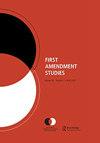汉娜·阿伦特的机器:人工智能时代的市场理论再评价
Q2 Social Sciences
引用次数: 0
摘要
人工智能的传播者正在日益影响人类话语。算法和机器人正在决定个人遇到的想法的范围和频率,最终引发了一个问题,即最高法院传统上设想的第一修正案的思想市场理论能否继续作为法官合理化广泛言论自由保障的主导工具。特别是,人工智能行动者的出现,淹没了人类的想法,传播了虚假和误导性的信息,似乎只会加剧对该理论假设的长期批评。本文借鉴汉娜·阿伦特的政治哲学,在最高法院使用市场理论进入第二个世纪之际,构建了一种修正的市场理论方法。阿伦特的思想,特别是关于人类制造的机器调节人类行为的力量,以及她对社区、真理以及动物实验室和人类制造者之间的二分法的关注,在修改市场方法时是独特的,而且考虑相对不足。本文章由计算机程序翻译,如有差异,请以英文原文为准。
Hannah Arendt’s machines: Re-Evaluating marketplace theory in the AI era
ABSTRACT Artificially intelligent communicators are increasingly influencing human discourse. Algorithms and bots are determining the range and frequency of ideas individuals encounter, ultimately raising questions about whether the marketplace of ideas theory of the First Amendment, as it has traditionally been envisioned by the Supreme Court, can continue to endure as justices’ dominant tool for rationalizing extensive safeguards for free expression. In particular, the emergence of AI actors, which drown out human ideas and spread false and misleading information, appear to only worsen the long-standing criticisms of the theory’s assumptions. This article draws from Hannah Arendt’s political philosophy to construct a revised approach to marketplace theory as it enters its second century of use by the Supreme Court. Arendt’s ideas, especially as they pertain to the power of human-made machines to condition human behavior, as well as her concerns regarding community, truth, and the dichotomy between animal laborans and homo faber, are uniquely suited, as well as relatively under considered, when it comes to revising the marketplace approach.
求助全文
通过发布文献求助,成功后即可免费获取论文全文。
去求助
来源期刊

First Amendment Studies
Social Sciences-Law
自引率
0.00%
发文量
0
期刊介绍:
First Amendment Studies publishes original scholarship on all aspects of free speech and embraces the full range of critical, historical, empirical, and descriptive methodologies. First Amendment Studies welcomes scholarship addressing areas including but not limited to: • doctrinal analysis of international and national free speech law and legislation • rhetorical analysis of cases and judicial rhetoric • theoretical and cultural issues related to free speech • the role of free speech in a wide variety of contexts (e.g., organizations, popular culture, traditional and new media).
 求助内容:
求助内容: 应助结果提醒方式:
应助结果提醒方式:


